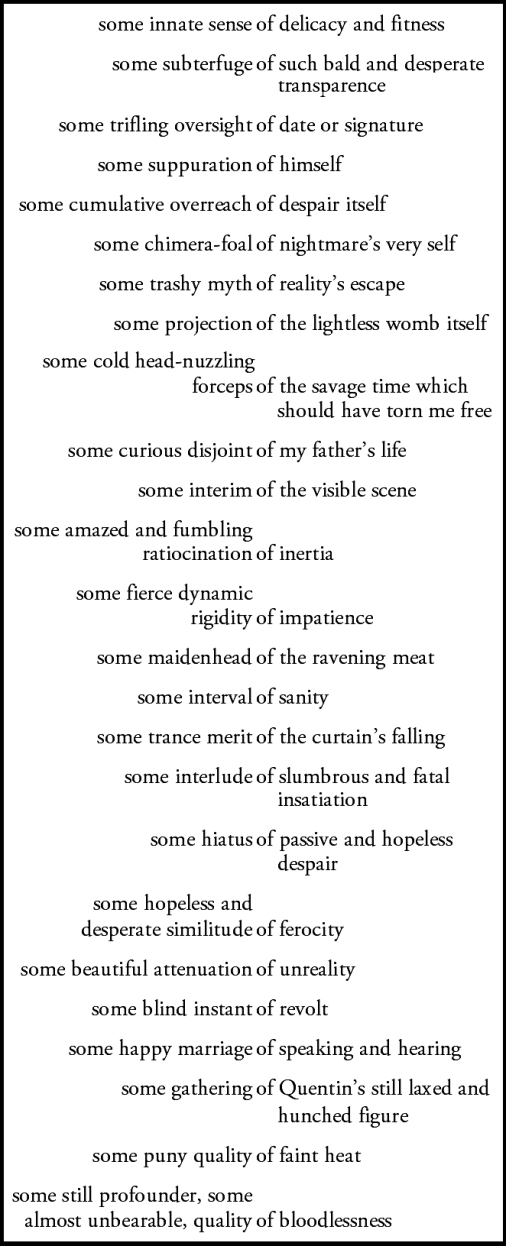Each of Absalom, Absalom!’s various conspicuously repeated words is like a little weight with its own distinct measure of flamboyance: The degree to which any one of them tips the scale into flagrant exhibitionism is the product of how showoffy it is, multiplied by the number of reiterations you stack up on the weighing platform. Fierce, for example, is hardly a vocabulary peacock, but—used over thirty times in a single novel—it does begin to call attention to itself. (On our scale, fierce is, like, 2 grams.) On the other hand, something like epicene—defined as “having the characteristics of both sexes”—even if used only twice (a stylish college dandy likened to an “almost epicene object d’art” and a period of prepubescence characterized as “one anonymous climaxless epicene and unravished nuptial”)—well, it very much tips the scale. (Epicene: kilo and a half.) Especially if its appearances are in two successive chapters, only 35 pages apart.
So, upon first encountering a word like fatalistic—there’s a mention early on in the book of someone’s “expression of fatalistic and amazed determination”—one might not even register its heft. (We’re talking 10 grams here; 15, tops.) But even if each minor shift in a scale’s balance is unnoticeable with the addition of every tiny incremental weight, that scale is shifting nonetheless; eventually, it may just clonk over onto the table.
It is with the Chapter 4 introduction of Charles Bon—the epicene object d’art mentioned above and also an “indolent fatalist” who befriends Henry Sutpen at school—that one may begin to sense a serious tilt in the equilibrium; resignation may start to set in at the inevitability of this particular overuse as Bon is said to possess “fatalistic and impenetrable imperturbability” and is referred to as “the fatalist to the last” and “Bon the fatalist.” (This all within a single chapter, which furthermore concerns Bon’s complicated relationship with Henry and his sister Judith—“[p]erhaps in his fatalism he loved Henry the better of the two”—and also establishes the chronological limitations of his deterministic influence—“[s]urely Bon could not have corrupted her to fatalism in twelve days.”*)
Bon may not be Absalom!’s sole bearer of the weight of this weary surrender—another character at one point regards an unwelcome sight with “aghast fatalistic terror”—but he is certainly its standard bearer: In later chapters, others will recall his memory (“Bon whom Mr Compson had called a fatalist”), reminisce about his salient characteristics (“the weariness, the fatalism”), and gauge themselves by his standard (“[he] maybe even turned fatalist like Bon now”**).
Of course, Bon’s solemn perspective makes perfect sense within a fictional cosmos of such desperately tragic preordination that the word doom appears as many times as fierce. It’s probably hard to lighten up when your every step is so perilously permanent and life offers no do-overs—every “decision instantaneous and irrevocable,” every move leading to “subsequent irrevocable courses of resultant action,” every positive development in the grand scheme of things met with the “irrevocable negation of the design.” Here you are, trying to make your way in “the irrevocable world,” ever mindful of the passage of “all irrevocable time,” standing on the threshold—“that irrevocable demarcation”—of the rest of your life, serving the “irrevocable sentence” of your years on this planet, doing your best to protect yourself from “irrevocable and incalculable damage,” seeking to forge your own identify after “the irrevocable repudiation of the old heredity,” chasing after some “lost irrevocable might-have-been,” and trying to plumb—unsuccessfully—the “irrevocable and unplumbable finality” of your destiny. You’ve got a right to be a little tetchy.
After all, things are tough all over—for the fatalistic female as much for the fatalistic fellow: a gal could find herself “irrevocably husbanded,” but then later (not so irrevocable after all, the husbanding, it would seem) “irrevocably estranged”—“not only divorced from, but irrevocably excommunicated from all reality,” just praying that her latest travail might fall “irrevocably outside the scope of her hurt or harm.” Maybe the family home is threatened because the once-husband has “his back rigid and irrevocably turned upon the house”; maybe he suffers from Peter Pan Syndrome and has “irrevocably lost count of his age.”
This can lead a person to say things like “it is irrevocable now” (p. 252) and “it was done, irrevocable now” (p. 272). This can result in curiously tangled concepts such as “irrevocable undefeat” (it may not be clear what, precisely, undefeat is, but we do know that it’s permanent). This can produce such snake-eating-its-tail configurations as “a curious and outrageous exaggeration in which was inherent its own irrevocability,” which, if a touch baffling, sounds way too self-contained to argue with.
To close, it would feel appropriate here to make some fanciful suggestion as to how much irrevocable would weigh on my proposed metaphorical scale—but I’m just afraid that once I suggested it, I wouldn’t be able to take it back. Ever.
• • •
*Surely not. She remains—next sentence—“anything but a fatalist.”
**For whatever reason—whether it’s regarding his fatalism, his “expression which was not smiling but just something not to be seen through,” his “cryptic” vocal stylings, or his fool/not-a-fool dualism—Bon’s is the character who really seems to kick Faulkner’s descriptive Xerox into high gear.
